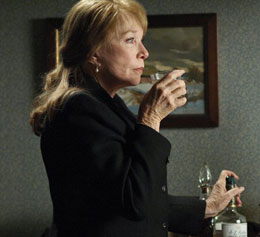January 2, 2008
Closing the Ring is an unworthy epitaph for Richard Attenborough’s directing career. So let’s hope he makes another film soon. Beautiful and bleak, Closing the Ring shifts unevenly between past and present, America and Northern Ireland, romance and regret, danger and drama.
In 1941 three American airmen – Teddy, Jack and Chuck - are in love with Ethel. When she marries Teddy, the boys make a pact that if anything happens to the husband, one of the others will take care of her. Sure enough, Teddy’s B-17 crashes into Belfast’s Black Mountain. Although she still loves Teddy, Ethel marries the doting Chuck and starts a family.
Years later, at the height of The Troubles, a young Irish boy (an engaging Martin McCann) finds Teddy’s wedding ring on the mountain and vows to return it to America where Ethel still lives, elderly, irascible and irresponsible. With Chuck recently dead and a daughter (Neve Campbell) who hates her, closing the ring on the past will prove to be a powder-keg moment for all involved, on both sides of the water.
Attenborough’s film is unashamedly old-fashioned. That’s both good and bad. It’s refreshing to see a veteran hand crafting a title sequence of unapologetic romanticism. Good, too, to see character-driven drama given a fresh spin. And Attenborough handles the time-slip narrative assuredly. But his sentimental approach is overblown. The histrionic ending is unconvincing at best – and laughable for all but the most indulgent audience.
It’s not all Attenborough’s fault. Peter Woodward’s script, based on the real discovery of a war-time ring, lays on coincidence with a trowel – the Irish Troubles sitting uneasily with the American storyline. Fundamentally, the characters are largely unappealing and only rarely does the script seem to realize it. But it’s the calamitously handled, ticking-bomb finale that wrecks any chance of the characters being taken seriously.
Shirley Maclaine is suitably irritating as the devil-may-care Ethel, who’s locked herself away in memories of Teddy, with little love for her husband, Chuck. But the emotional powerhouse of the movie is the under-used Neve Campbell as Ethel’s daddy-loving daughter who explodes at her mother’s selfishness: it’s the film’s most deftly-handled scene, devastatingly-performed, shatteringly effective.
It’s refreshing to see adults depicted as irresponsible, the young as voices of reason. Interesting too that for all Attenborough’s love of old-fashioned film-making, he turns the camera away from the violence but lets it dwell unnecessarily – and anachronistically – on the nakedness of Mischa Barton (as the young Ethel). At odds with the sentimentality, it’s more evidence of Attenborough’s uneven approach.
In the end, Attenborough doesn’t so much close the ring as shatter it: the abiding sense is one of frustration, not completion.
In 1941 three American airmen – Teddy, Jack and Chuck - are in love with Ethel. When she marries Teddy, the boys make a pact that if anything happens to the husband, one of the others will take care of her. Sure enough, Teddy’s B-17 crashes into Belfast’s Black Mountain. Although she still loves Teddy, Ethel marries the doting Chuck and starts a family.
Years later, at the height of The Troubles, a young Irish boy (an engaging Martin McCann) finds Teddy’s wedding ring on the mountain and vows to return it to America where Ethel still lives, elderly, irascible and irresponsible. With Chuck recently dead and a daughter (Neve Campbell) who hates her, closing the ring on the past will prove to be a powder-keg moment for all involved, on both sides of the water.
Attenborough’s film is unashamedly old-fashioned. That’s both good and bad. It’s refreshing to see a veteran hand crafting a title sequence of unapologetic romanticism. Good, too, to see character-driven drama given a fresh spin. And Attenborough handles the time-slip narrative assuredly. But his sentimental approach is overblown. The histrionic ending is unconvincing at best – and laughable for all but the most indulgent audience.
It’s not all Attenborough’s fault. Peter Woodward’s script, based on the real discovery of a war-time ring, lays on coincidence with a trowel – the Irish Troubles sitting uneasily with the American storyline. Fundamentally, the characters are largely unappealing and only rarely does the script seem to realize it. But it’s the calamitously handled, ticking-bomb finale that wrecks any chance of the characters being taken seriously.
Shirley Maclaine is suitably irritating as the devil-may-care Ethel, who’s locked herself away in memories of Teddy, with little love for her husband, Chuck. But the emotional powerhouse of the movie is the under-used Neve Campbell as Ethel’s daddy-loving daughter who explodes at her mother’s selfishness: it’s the film’s most deftly-handled scene, devastatingly-performed, shatteringly effective.
It’s refreshing to see adults depicted as irresponsible, the young as voices of reason. Interesting too that for all Attenborough’s love of old-fashioned film-making, he turns the camera away from the violence but lets it dwell unnecessarily – and anachronistically – on the nakedness of Mischa Barton (as the young Ethel). At odds with the sentimentality, it’s more evidence of Attenborough’s uneven approach.
In the end, Attenborough doesn’t so much close the ring as shatter it: the abiding sense is one of frustration, not completion.




